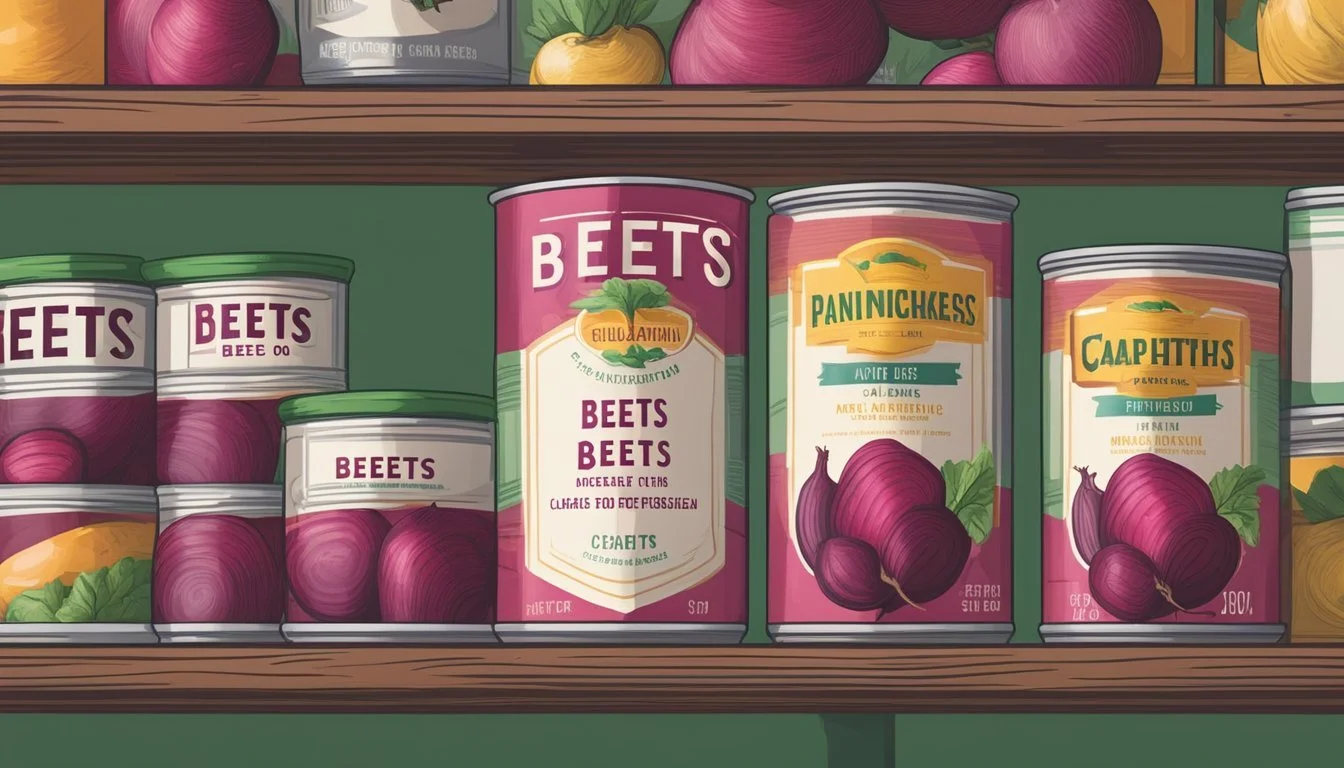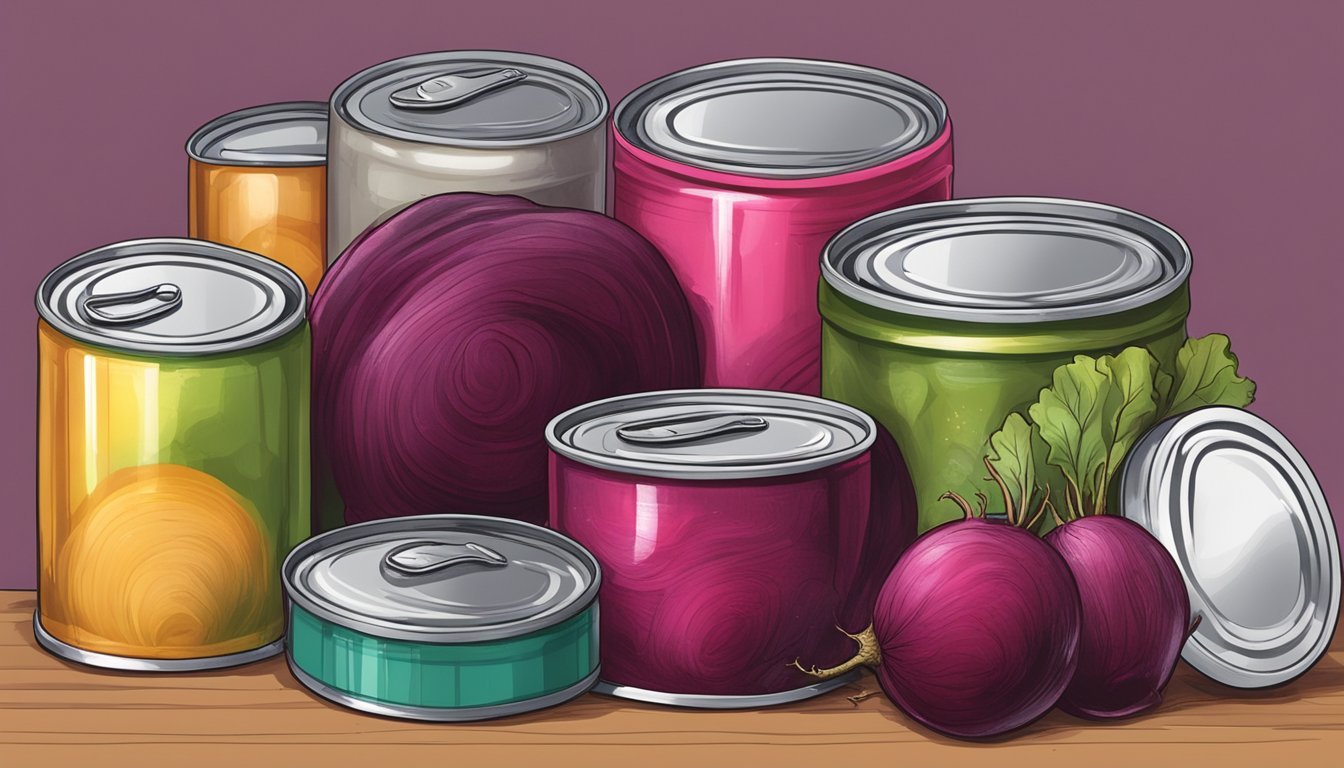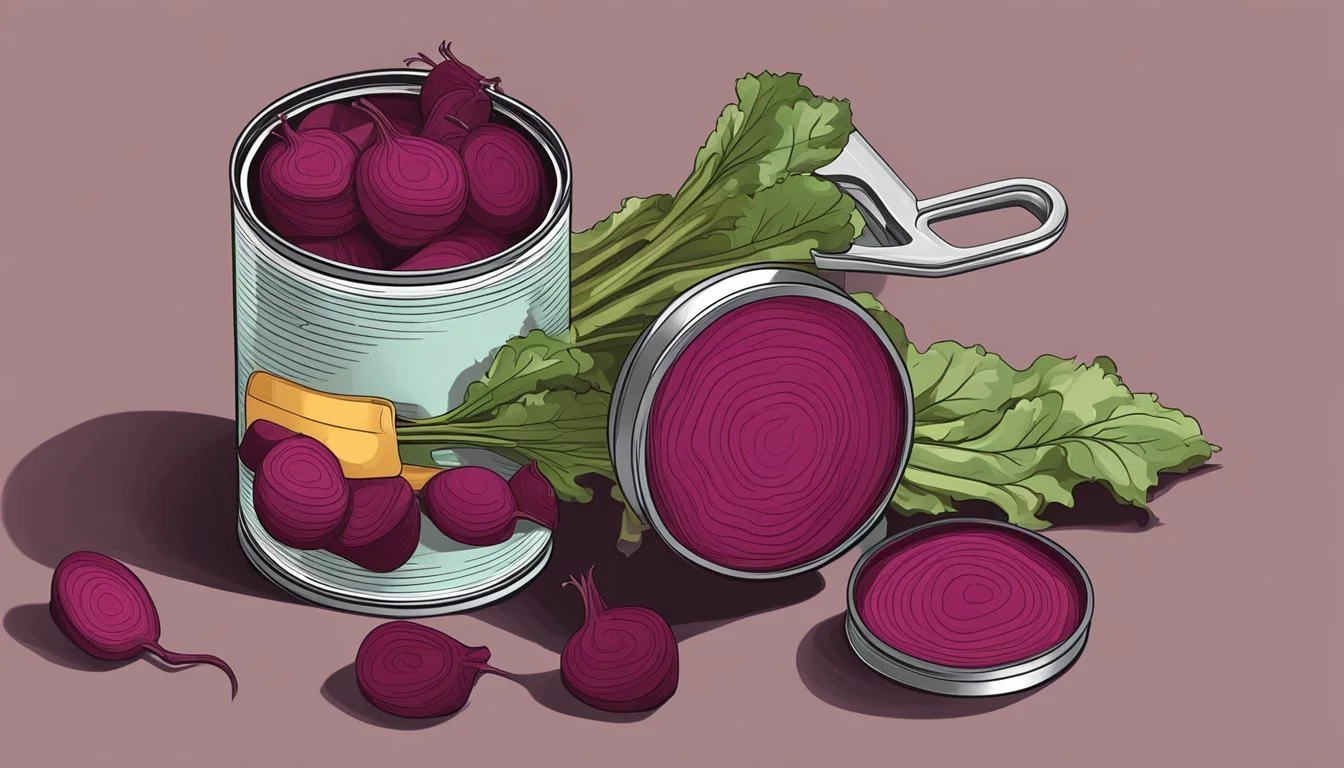Do Canned Beets Go Bad?
Understanding Shelf Life and Storage
Canned beets are a convenient and nutritious addition to any pantry, but they do have their limits. Unopened canned beets can last for a considerable period, often retaining their quality for years when stored in a cool, dry place. However, once opened, their shelf life diminishes significantly, necessitating proper refrigeration to keep them fresh for about 5-7 days.
Signs of spoilage in canned beets, whether opened or unopened, are crucial to recognize. Off odors, discoloration, and the presence of mold indicate that consumption should be avoided. Additionally, cans that are leaking, rusting, bulging, or severely dented should be discarded to prevent potential health risks.
Storing canned beets correctly extends their usability. An unopened can should be kept in a dry, cool environment away from direct sunlight. After opening, transfer the contents to an airtight container and refrigerate promptly to maintain optimal freshness and safety. Understanding these guidelines ensures the best use of canned beets in your meals.
Understanding Canned Beets
Canned beets are a convenient and long-lasting option for incorporating this nutritious root vegetable into your diet. The following sections cover their nutritional profile, the canning process that helps preserve them, and the different types available.
Nutritional Profile
Canned beets retain many of the health benefits associated with fresh beets. They are rich in vitamins, particularly folate, and minerals such as iron and potassium. A notable nutrient in beets is nitrates which help in lowering blood pressure. Canned beets also contain sodium which acts as a preservative, but this can mean higher sodium content than fresh beets. Despite this, they remain an excellent source of essential nutrients.
Canning Process and Preservation
The canning process involves heating cooked beets and sealing them in an airtight container. This method helps extend their shelf life, allowing them to last for several years when stored correctly. Storage conditions such as a cool, dry place away from direct sunlight are recommended. Properly canned beets typically do not require refrigeration until opened, maintaining their quality for an extended period.
Different Types of Canned Beets
There are various types of canned beets available, catering to different preferences and culinary needs. Pickled beets offer a tangy flavor due to vinegar and other seasonings used in the pickling process. Small beets are often canned whole and are perfect for salads and side dishes. Other varieties include sliced and diced beets, which are convenient for cooking and mixing into recipes. Canned beets provide flexibility in the kitchen while maintaining the nutritional benefits of this root vegetable.
How to Store Canned Beets
Storing canned beets properly ensures they maintain their best quality. The process differs before and after opening to guarantee long shelf life and food safety.
Before Opening
Unopened canned beets should be stored in a cool, dry place, such as a pantry or cupboard. Avoiding heat sources and moisture prevents damage to the cans.
Optimal storage conditions play a key role. Keep the temperature stable to avert compromising the integrity of the can.
Closely monitor expiration dates and store cans in an organized manner, ensuring older cans are used first. Proper sorting minimizes the risk of spoilage and helps maintain best quality.
After Opening
Once opened, transfer unused beets to an airtight container and refrigerate. Storing them in the fridge extends their lifespan.
Exposure to air and bacteria can accelerate spoilage, so ensure containers are well-sealed. Refrigerated beets last about 5-7 days under these conditions.
For longer storage, freezing is an option. Place beets in covered airtight containers or heavy-duty freezer bags. Note that the texture may soften after thawing, making them more suitable for cooked dishes.
By following these storage tips, the shelf life and quality of canned beets can be maximized.
Identifying Spoiled Canned Beets
Identifying spoiled canned beets can prevent the consumption of potentially harmful food. Key indicators of spoilage include visual signs, changes in texture, and odor and flavor changes.
Visual Signs
Visual inspection is a crucial first step. Rust, bulging, and leaking cans indicate damaged packaging, which can compromise the safety of the contents. Discoloration or the presence of mold are clear signs of spoilage within the can itself.
Mold growth, especially if it is black, white, or green, signals that the beets are no longer safe to consume. Also, any bruising or soft, wet areas on the beets should be avoided.
A dented can doesn't necessarily indicate that the beets inside are bad, but it should be closely inspected for further signs of spoilage like rust and bulging.
Changes in Texture
Texture changes often accompany spoilage in canned beets. Fresh beets should remain firm and crisp. If the beets have become mushy or have a slimy texture, this is a clear sign they have gone bad.
Beets that feel limp, much like a deflated balloon, are also past their prime. Firmness is a reliable indicator; a marked change can point towards spoiled beets.
Additionally, a grainy or overly soft texture upon opening the can should raise concerns. Such texture changes suggest bacterial growth or degradation over time.
Odor and Flavor Changes
The smell is one of the most telling indicators of spoilage. Fresh canned beets maintain a natural, slightly sweet odor. If the canned beets emit a rotten smell, or any foul odor, they should not be consumed.
Spoiled beets will often taste off as well. An unusual bitter flavor or any departure from the expected taste can indicate spoilage. Fresh beets should have a mild and naturally sweet flavor, so any significant change in odor and flavor warrants caution.
Avoiding these spoiled beets helps in reducing food waste and ensures safety in consumption. Always prioritize the expiration date but combine it with these sensory checks for best results.
Utilizing Beets Post-Opening
Once canned beets are opened, their shelf life is limited, but they can still be used in a variety of ways. Proper storage and creative recipes can help make the most of these cooked beets.
Creative Recipes
Opened canned beets can be transformed into a range of delicious dishes. Salads are a popular option; simply toss the beets with goat cheese, walnuts, and arugula for a refreshing meal. Soups such as borscht can benefit from the vivid color and taste of beets, providing both nutrients and a vibrant appearance.
Smoothies are another creative use. Blend beets with fruits like berries and bananas for a nutritious, energy-boosting drink. Additionally, consider roasting beets with olive oil, salt, and herbs. This can make for a flavorful side dish or a component in more elaborate beet recipes.
Storing Cooked Beets
Proper storage is crucial to maintain the freshness of cooked beets. Once opened, they should be transferred to a covered glass or plastic container and kept in the fridge. They can last up to 5-7 days under these conditions.
For longer storage, freezing is an option. Place cooked beets in an airtight container or freezer bag. In the freezer, they can last several months. If planning to reheat, be mindful of thawing methods. For the best quality, thaw in the refrigerator rather than using a microwave, which may affect texture and flavor.
Additionally, don't forget about beet greens. If you have them, they can be stored in the fridge for a couple of days and used in various recipes or salads. Properly managing leftovers and ensuring airtight storage can help maintain the utility and taste of the beets.
Extending Shelf Life of Beets
Beets can be preserved longer through various methods such as freezing and canning at home. These methods help maintain the quality and edibility of beets, preventing waste and extending their usability in everyday meals.
Freezing and Blanching
Freezing is an effective way to prolong the shelf life of beets. Before freezing, blanching is necessary to preserve color, texture, and nutrients. Blanch the beets by boiling them for 3-5 minutes, then immediately submerge them in ice water to halt the cooking process.
Once blanched, drain and dry the beets thoroughly. Place them in airtight containers or heavy-duty freezer bags. Properly stored, blanched beets can last in the freezer for 10-12 months while maintaining good quality. It is important to label containers with dates to keep track of storage time.
Pickling and Canning at Home
Pickling is another method that significantly extends the shelf life of beets. By immersing beets in a mixture of vinegar, water, salt, and sometimes sugar, beets become preserved and develop a unique flavor. Pickled beets can be stored in the refrigerator for several months, retaining their taste and nutritional benefits.
Canning beets at home involves placing cooked beets in sterilized jars and processing them in a water bath or pressure canner. This method ensures that the beets are free from harmful bacteria and can be stored for up to a year. Use proper canning techniques to ensure food safety and quality.
Safety and Health Considerations
Canned beets provide a variety of health benefits but require proper handling to ensure they remain safe for consumption. Maintaining the right storage conditions and understanding their nutritional impact is crucial.
Avoiding Foodborne Illnesses
To reduce the risk of foodborne illnesses, follow proper storage practices for canned beets. Unopened cans should be kept in a cool, dry place away from direct sunlight. Look for signs of spoilage, such as damaged packaging or unusual smells, as these can indicate the presence of harmful bacteria like Clostridium botulinum. Once opened, store beets in an airtight container in the refrigerator, and consume them within 5-7 days to prevent mold growth.
Beet Consumption and Well-being
Canned beets are rich in nitrates, which can aid in lowering blood pressure. They contain numerous healthy nutrients such as fiber, vitamins, and minerals. Additionally, incorporating beet greens can offer additional nutrients like vitamins A, C, and K. While they offer many health benefits, individuals with kidney stones should limit beet intake due to the high oxalate content. Proper consumption ensures the retention of their nutritional value without adverse effects.
Myths and Misconceptions
Canned beets are a convenient and nutritious option, but misconceptions about their shelf life and health benefits can lead to unnecessary waste and missed advantages. Addressing these myths can help you make better decisions regarding canned beets.
Shelf Life Expectations
Many believe that canned beets expire quickly after the printed "expiration" date. In truth, an unopened can of beets can maintain its best quality for 3 to 5 years when stored properly. Even after this period, if the can is undamaged and stored in a cool, dry place, the contents are often still safe to consume.
Once opened, however, the shelf life changes drastically. Opened canned beets should be refrigerated and consumed within 5 to 7 days to avoid spoilage. Look out for signs such as texture change, unpleasant smell, or visible mold to determine if they have gone bad.
Health Advantages of Beets
A common misconception is that the health benefits of beets are diminished when canned. Canning may reduce some water-soluble vitamins but the nutritional value remains significant. Canned beets are rich in essential nutrients such as fiber, folate, and manganese. They contain nitrates, which have beneficial effects on blood pressure and stamina.
Canned beets retain their vibrant color and distinct taste, making them a flavorful addition to meals without compromising nutritional content. They are an excellent source of antioxidants, which support overall wellness and maintain a healthy immune system.
Understanding these myths can help maximize the use of canned beets and ensure they are enjoyed for their taste and health benefits while minimizing waste.









